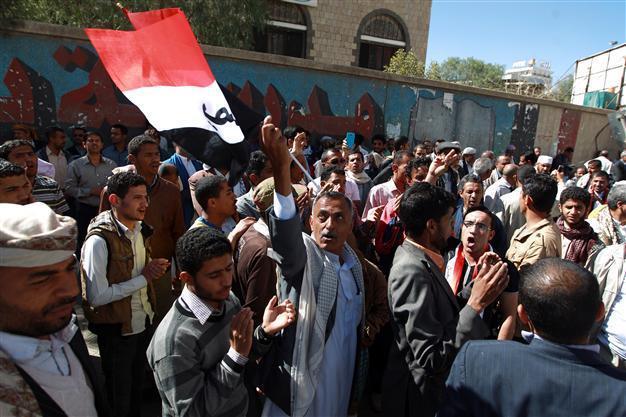Huthis refuse to cede Yemen power in face of 'threats'
SANAA - Agence France-Presse

Yemenis shout slogans during a rally against the occupation of the capital by Shiite Huthi rebels on February 14, 2015 in the capital Sanaa. AFP Photo.
The Shiite militia that seized power in Sanaa said on Feb. 15 it will not cave in to "threats" after Yemen's Gulf neighbours urged the UN to act forcefully against its takeover.
"The Yemeni people won't cede power in the face of threats," spokesman Mohammed Abdulsalam said, quoted by the official Saba news agency, which the Shiite Huthi militia now controls.
Abdulsalam insisted that Yemenis were "engaged in a process of self-determination free of any (foreign) tutelage".
Yemen's Gulf neighbours on Saturday urged the international community to act forcefully over the deteriorating security situation in the Arabian Peninsula country, including possible military intervention.
The United Nations Security Council is expected to adopt a resolution on Sunday urging the Huthis to step aside, release government officials and begin UN-brokered negotiations, diplomats said.
Calling for the Huthis to act "immediately and unconditionally," the draft resolution demands they "withdraw their forces from government institutions... and relinquish government and security institutions".
The Huthis seized Sanaa in September before tightening their grip and prompting Western-backed President Abedrabbo Mansour Hadi to tender his resignation.
They dissolved parliament and installed a "presidential council" to run Yemen on February 6, sparking security concerns that saw several Arab and Western countries close their embassies and evacuate diplomats.
On Sunday the militia spokesman denounced as "provocative blackmail" demands for the Huthis to relinquish power.
The withdrawal of ambassadors "reflects the panic that has hit some political forces which aren't betting on the people... and their dignity, but on foreign" countries, said Abdulsalam.
"These embassies are here to oversee the interests of their own countries and not those of the (Yemeni) people," he added.
Among the countries that have closed their embassies and pulled out their staff are Britain, France, Germany and the United States. Saudi Arabia and the United Arab Emirates have taken similar action.
Yemen is home to Al-Qaeda in the Arabian Peninsula, regarded by the United States as the network's deadliest branch and which claimed a January 7 attack on French satirical magazine Charlie Hebdo in which 12 people were killed.
The country has seen a rise in unrest since an Arab Spring-inspired uprising forced former strongman Ali Abdullah Saleh to step down in February 2012.
UN Secretary General Ban Ki-moon has warned that Yemen is falling apart and called for Hadi to be reinstated.
